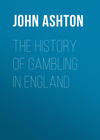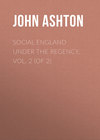Kitabı oku: «The Dawn of the XIXth Century in England», sayfa 17
CHAPTER XXXIV
Gambling – Downfall of Lady Archer, &c. – Card playing in the Royal Circle – Card money – High play – Play at the Clubs – Lotteries – The method of drawing them – Horse racing – Turf and horses better than now – Curious names of race horses – Ladies Lade and Thornton – Lady Thornton’s races – Tattersall and Aldridge.
ONE VICE the women of that age had, in common with the men, and that was Gambling – which, perhaps, was not so bad among the former, as during the last years of the preceding century, when Ladies Archer, and Buckinghamshire, and Mrs. Concannon were pilloried, and scourged metaphorically by the Satirists, as they were promised to be treated, physically, by Lord Kenyon. Their race was run – as expressed in the Morning Post, January 15, 1800: “Society has reason to rejoice in the complete downfall of the Faro Dames, who were so long the disgrace of human nature. Their die is cast, and their odd tricks avail no longer. The game is up, and very few of them have cut with honours.”
Mrs. Concannon still kept on, but not in London, as is seen by the following paragraph. Morning Herald, December 18, 1802: “The visitors to Mrs. Concannon’s petits soupers, at Paris, are not attracted by billets previously circulated, but by cards, afterwards dealt out, in an elegant and scientific manner; not to mince the matter, they are the rendezvous of deep play: and the only questionable point about the matter is, whether the Irish, or the French, will prove victors at the close of so desperate a winter’s campaign.”
Still, we find even in the Royal circle, where the utmost gravity of demeanour, and purity of manner, were to be found, the card table was the evening’s amusement. “The evening is, as usual, passed at cards, in the Queen’s Drawing Room, where three tables are set out.” And cards were still the staple entertainment both for men and women, at night. Naturally, the latter did not play for such high stakes as the men did; but they contrived to make, or lose, a sufficient sum, either to elate, or to depress them, and experience, as far as in them lay, all the fierce feelings of the gambler. Nay, some made a pitiful profit out of their friends – in the shape of “card money” – which meant that the players put so much, every game, into a pool (generally the snuffer tray) to pay for the cards, and something for the servants.
It was a practice in its death throes, having been mortally wounded, by public opinion, at the end of the last century; but the little meanness still obtained —vide the Morning Herald, December 15, 1802: “In a pleasant village near the Metropolis, noted for its constant ‘tea and turn out parties,’ the extortion of Card Money had, lately, risen to such a pitch, that it was no unusual thing for the Lady of the House, upon the breaking up of a table, to immediately examine the sub-cargo of the candlestick, and, previous to the departure of her guests, proclaim aloud the lamentable defalcation of a pitiful shilling, which they might, perchance, have forgot to contribute. We are happy to find that some of the most respectable people in the place have resolved to discountenance and abolish this shabby genteel custom, which has too long prevailed; a shameful degradation of everything like English hospitality.”
But they sometimes played as high as did the opposite sex – the climax, perhaps, coming in the following, from the Morning Post, April 5, 1805: “The sum lately lost at play by a Lady of high rank is variously stated. Some say it does not amount to more than £200,000, while others assert that it is little short of £700,000. Her Lord is very unhappy on the occasion, and is still undecided with respect to the best mode to be adopted in the unfortunate predicament.”
The men lost and gained large sums of a night; and, for that age, gaming had reached its climax. Little birds whisper50 that it is not much better now; but, at all events, it is not so open. From the highest to the lowest – from the Heir Apparent, and the two great leaders of party, Fox and Pitt, down to the man who could only afford to punt his shilling, or half-crown, at a “silver hell” – all were bitten, more or less, by this mania of gaming. The magistrates lashed the petty rogues when they were caught, but winked discreetly at the West-end Clubs, and ordered no raids upon them. There they might win or lose their thousands, secure that the law would not stretch out its arm to molest them. There the nobility, legislators, country gentlemen, and officers of the army, met together on a common footing, to worship the Demon of Play.
There were three principal Clubs – White’s, Brookes’, and Boodles’. White’s was originally a “Chocolate House” in William the Third’s time, but became a private club early in the eighteenth century, and was used by the Tories. It was a club always noted for high play and betting, and very curious some of their bets were, the old wager book being still preserved. Brookes’ was the Whig Club, and was then conducted by that
“liberal Brookes, whose speculative skill
Is hasty credit and a distant bill;
Who, nurs’d in Clubs, disdains a vulgar trade,
Exults to trust, and blushes to be paid.”
Among the members of this club were the Prince of Wales, and, of course, his fidus Achates, Sheridan, besides the great Charles James Fox, who here played deeply, and whose name is oft recorded in the wager book, which, however, is of older date, and was kept when the club was held at Almack’s.
“Lord Northington bets Mr. C. Fox, June 4, 1774, that he (Mr. C. F.) is not called to the bar before this day four years.”
“March 11, 1775. Lord Bolinbroke gives a guinea to Mr. Charles Fox and is to receive a thousand from him whenever the debt of this country amounts to 171 millions. Mr. Fox is not to pay the £1,000 till he is one of His Majesty’s Cabinet.”
“April 7, 1792. Mr. Sheridan bets Lord Lauderdale and Lord Thanet, twenty-five guineas each, that Parliament will not consent to any more lotteries after the present one voted to be drawn in February next.”
At all the clubs, gaming was practised more or less. Morning Herald, June 16, 1804: “A noble Lord, lately high in office, and who manifests a strong inclination to be reinstated in his political power, lost at the Union, a night or two back 4,000 guineas before twelve o’clock; but, continuing to play, his luck took a turn, and he rose a winner of a thousand before five the next morning.”
Again, to show the large sums then won and lost at gambling, take the following newspaper cuttings.
Morning Post, June 30, 1806: “The Marquis of H – d is said to have been so successful at play this season, as to have cleared £60,000. The Earl of B – e has won upwards of £50,000, clear of all deductions. A Right Reverend is stated to be amongst those who are minus on this occasion.”
Morning Post, July 8, 1806: “A certain noble Marquis, who has been so very fortunate this season in his gaming speculations, had a run of ill luck last week. At one sitting, his lordship was minus no less a sum than thirteen thousand pounds!”
Morning Post, July 15, 1806: “The noble Marquis, who has been so great a gainer, this season, at hazard, never plays with any one, from a Prince, to a Commoner, without having the stakes first laid on the table. His lordship was always considered as a sure card, but now his fame is established, from the circumstance of his having cleared £35,000, after deducting all his losses for the last six months.”
But, although the magistrates shut their eyes to the sins of the great, and punished the small, when brought before them, the Government systematically demoralized the people by means of lotteries. True, it was a great temptation, for it yielded a revenue to the State of about £350,000, besides the licenses of the brokers, £50 each. Very jealous was the Government to protect its children from the pernicious effects of private lotteries; they were anathema, and, besides, they would absorb some of the profit, which otherwise would have gone into the pockets of a paternal rule. In this decade, there were but two private lotteries, and, for both of them, a special act of Parliament was required, viz., that of the Pigot diamond in 1800, and Boydell’s pictures in 1805.
This illustration is by Pyne, and, like all his drawing, is extremely graphic. It represents the Life Guards, who then had to perform many of the duties of our police, conveying the Lottery wheels, from Somerset House (or Somerset Place, as it was then called) to Cooper’s Hall, in Basinghall Street, where the Lottery was then drawn. There were four sledges employed for the purpose, two carrying the wheels containing the tickets, with their blanks, or prizes, and the other two bore the cases for the wheels. They were drawn by three horses each.
For many years the Lottery had been drawn at Guildhall, but it was afterwards removed to Cooper’s Hall. At both places the tickets were drawn out of the wheels by two scholars of Christ’s Hospital, or Bluecoat boys – who were thus selected for this office because their youth, and supposed integrity,51 rendered them less liable than other boys, to be tampered with. The accompanying illustration gives a very life-like presentment of the scene.
The last public Lottery, in England, was drawn in October, 1826.
Needless to say that Gambling, either in the form of card playing, dicing, or lotteries, was not the only way that fools and rogues could throw away their money. Still there were two resources left – the Turf, and Cock-fighting. The Turf was undoubtedly purer then than now, when it has reached such a pitch of refinement in blackguardism, and scoundrelism, that it must soon either be swept away, or violently reformed. Racing then was more for encouraging a breed of horses, swift, yet of such staying powers as to be able to run a four-mile heat without breaking down: not like our “exaggerated greyhounds,” who can barely stagger over a course of six furlongs, or three quarters of a mile.
The stakes were not so high, and although there was much betting on a race, yet it was among the upper class, or men who could afford to lose to each other, and in the society of their equals; and not as at present, when a lord is on familiar terms with a ruffian, so long as he will give the odds required, and may possibly be able to pay if he loses; nor, then, did shop boys make books on races, or talk learnedly of double events, &c., and such scenes as can now be witnessed any race day in Fleet Street, were utterly unknown, and undreamt of. A King’s plate of £100 was then considered worth running for, and noblemen, and gentlemen, matched their horses one against the other, in a proper spirit of emulation.
There was a fair amount of racing literature – “Baily’s Racing Register,” “Pick’s Racing Calendar,” “The Turf Register,” “The Racing Calendar,” and “The Sporting Magazine,” and I know, and care not, whether this is an exhaustive list. From some of them we get some curious names of race horses, for their owners then, seem to have run riot in the nomenclature of their animals. What should we say nowadays to such names as “Kiss in a Corner,” “Jack, come tickle me,” “Jenny, come tye me,” “I am little, pity my condition,” “Jack’s my favourite,” “Britons, strike home,” “Why do you slight me?” “Turn about, Tommy,” “Sweeter when clothed,” “Watch them and Catch them,” “First time of Asking,” “Fear not, Victorious,” “Hop, step, and jump,” &c., &c.
As a curious incident of manners in the early century, I may mention that two ladies, Lady Lade and Mrs. Thornton (wife of Col. Thornton), both rode matches in public. Mrs. Thornton’s brother-in-law, Mr. Flint, was stopping at the Colonel’s seat of Thornville, and riding with the lady in its grounds. They had a gallop, and Mrs. Thornton’s old horse, aided by her good riding, beat her antagonist, which so nettled him, that he challenged her to a further trial, which took place publicly, on the last day of the York August Meeting, 1804. Mrs. Thornton’s horse broke down, and she lost; but she did not omit to wail publicly over the matter, asserting that otherwise she would have won, and that her opponent took unfair advantage of her.
This exhibition of herself seems to have fired her ambition, for we read in the Morning Post, August 20, 1805:
“Mrs. Thornton is to ride 9 st. against Mr. Bromford, who is to ride 13 st., over the York Course, four miles; to run the last race on Saturday in the next August meeting, for four hogsheads of Coti Roti p.p. and 2,000 guineas h. ft.; and Mrs. T. bets Mr. B. 700 gs. to 600 gs. p.p.; the 2,000 gs. h. ft. provided it is declared to the Stewards four days before starting. Mrs. T. to have her choice of four horses.
“Mr. B. to ride Allegro, sister to Allegranti.
“N.B. Colonel T., or any gentleman he may name, to be permitted to follow the lady over the course, to assist her in case of any accident.”
When it came to the pinch, Mr. Bromford declined the race, paid his forfeit, and the lady walked over. Later in the day, however, she raced Buckle, a jockey, mounted on Allegro – carrying 13 st. 6 lb., whilst Mrs. Thornton scaled 9 st. 6 lb. – and she beat the professional by half a neck. This match does not seem to have been for any money, but merely for the honour of the thing.
Before quitting the subject of horses, I cannot help mentioning that both Tattersall, and Aldridge, were in existence, as equine auctioneers, a position which, their thorough integrity has consolidated, and preserved to the present day.
CHAPTER XXXV
Cock-fighting – Its illegality – Public recognition of it – Description of company at a cock-fight – High stakes – Bull-baiting – Debate thereon in the House of Commons – Prize-fighting – Famous pugilists – George IV. as a patron of the Ring – Attempts to put down prize-fighting – Female physical education – Cudgel-playing, and other sports.
COCK-FIGHTING was another way of gambling – a barbarous pastime, yet of great antiquity, and, changing the name of the combatants to quails, or partridges, extending all over the world, especially in the East. The Greeks had their Cock-fights, the Romans fought both cocks and quails. Of its introduction into England there is no certain date, but Fitz-Stephen, who died in 1191, mentions schoolboys as fighting their cocks on Shrove Tuesday. Edward III., Henry VIII., Elizabeth, and Cromwell, all prohibited Cock-fighting; yet, so popular was it, that no prohibition was of any avail, and the Royal fulminations passed unheeded, and fell into desuetude almost as soon as uttered.
In the time of which I write, Cocking was a recognized sport, publicly advertised. Morning Post, January 5, 1805: “Cocking, to be Fought on Monday, January 7, 1805, and continue all the week, at the Cock Pit Royal, South side of St. James’s Park, the Gentlemen of Suffolk, and the Gentlemen of Hampshire’s Main of Cocks, for Five Guineas the battle, and One Hundred Guineas the odd. To begin fighting each day precisely at Half-past Five o’clock.” Indeed, “Cock-fighting, Shooting, and Military Carriages” were advertised.
The Cock Pit Royal was in Bird Cage Walk, St. James’s Park, and was a great institution, until the expiration of its lease in 1816, when the landlord refused to renew. Of a sketch of its interior (by Rowlandson, and Pugin, in their “Microcosm of London”) the following description is given, which will better help to illustrate the sport than any words of mine, as the account is contemporary:
“This print may, without undue partiality, be acknowledged to excel that of Hogarth, upon the same subject. It is different in one particular: here the satire is general, not personal; a collection of peers and pickpockets, grooms and gentlemen, bons-vivants and bullies; in short, a scene which produces a medley of characters, from the highest to the lowest, has seldom been painted with an adherence to nature so strict and so interesting. The principal figure in the front row seems to anticipate the loss of the battle; his neighbour to the right appears to have some eggs in the same basket; whilst a stupid sort of despair in the countenance of the next figure proclaims that all hope is lost; the smiling gentleman on his left seems to be the winner. The clenched fists and earnest features of the personage in the same row, between two sedate contemplaters of the fight, make one feel that sort of interest which arises from a belief that victory depends upon only a little assistance being given at that particular moment to the bird upon whose side he has betted. In the centre, and on the highest row behind, are two figures, apparently intended as hurling defiance to the whole company; they are certainly offering odds, which no one is disposed to take. A little to the left, and just above the smart officer with a cocked hat, is a group inimitably portrayed. A parcel of knowing ones, who have betted pretty high, finding themselves in the wrong box, appear very desirous of edging off, and are attacking all together a personage who has been too much for them; his attitude is expressive, and, with his fingers thrust into his ears, seems to indicate that he will take no more bets; whilst the two figures (one in a cocked hat) to the left appear to enjoy the humorous expedient… On the right we discover a pugilistic exhibition, and at a little distance horsewhips and sticks brandished in the air; all these are the natural accompaniments of the scene. Upon the whole, this picture has great merit, and conveys a more perfect idea of the confusion and bustle of a Cockpit than any description.” This was written in 1808-9.
Sometimes very large sums depended upon these combats —vide Morning Post, April 28, 1800: “A main of cocks is to be fought this week at Newmarket, as interesting to the sporting world as that, last summer, at York. The match is ostensibly made between Mr. Cussans, and Mr. Germain; but Sir Harry Vane Tempest, and others we could name, are supposed to be the real principals. It is for 1,000 guineas a side, and forty guineas each battle. Great sums are depending, and much money will be sported.”
The last Act against Cock-fighting was 12 and 13 Vic., cap. 92 (August 1, 1849); but if any one imagines that, therefore, this amusement is extinct, he is very much mistaken.
Another cruel, yet intensely national sport, was Bull-baiting. Hardly a country town of note but had its “Bull-ring”; and, although the bull had but a circumscribed range, being tied by a rope to a stake, yet the dogs did not always get the best of the combat, and many a tyke met his death, or went a limping cripple for the remainder of his days. I have already noted one bull-baiting in the account of the Jubilee rejoicings at Windsor in October, 1709, and that must suffice.
A few years previously it had been made the subject of a debate in the House of Commons, where much special pleading in its favour was exhibited. On May 24, 1802,52 Mr. John Dent, M.P. for Lancaster, moved that the Bill to prevent Bull-baiting and Bull-running be read a second time. Sir Richard Hill pleaded the cause of the poor bulls, not very eloquently, but as earnestly as he could. He pointed out that an Act had been passed for the abolition of Bull-baiting in Ireland, and he called upon the Irish members to support this Bill.
Then up rose the Right Hon. W. Windham, M.P. for Norwich, and he contended that the cruelty was no greater than that comprised in the sports of hunting, shooting, and fishing. “If the effects of one were to be viewed through the medium of a microscope, why were not the consequences of the other to be scrutinized with equal severity?” In the course of a long speech he warmed to his view of the subject, until, at last, in the fervour of his eloquence, he burst into the following: “He believed that the bull felt a satisfaction in the contest, not less so than the hound did when he heard the sound of the horn which summoned him to the chase. True it was, that young bulls, or those that were never baited before, showed reluctance to be tied to the stake; but those bulls, which, according to the language of the sport, were called game bulls, who were used to baiting, approached the stake and stood there, while preparing for the contest, with the utmost composure. If the bull felt no pleasure, and was cruelly dealt with, surely the dogs had also some claim to compassion; but the fact was, that both seemed equally arduous in the conflict; and the bull, like every other animal, while it had the better side, did not appear to feel unpleasantly; it would be ridiculous to say he felt no pain; yet, when on such occasions he exhibited no sign of terror, it was a demonstrable proof that he felt some pleasure.”
Mr. Courtenay rose to a much greater height. Said he: “What a glorious sight to see a dog attack a bull! It animates a British heart —
‘To see him growl, and snap, and snarl, and bite,
Pin the bull’s nose, and prove instinctive might.’
Besides, if bull-baiting was given up, the characteristic of our British dogs, so classically celebrated in the Augustan age of literature, would be totally lost. Claudian says: ‘Magnaque taurorum fracturæ colla Britannæ.’ Symmachus mentions seven Irish bull-dogs: ‘Septem Scottici canes,’ as then first produced in the circus at Rome, to the great admiration of the people.’”
General Gascoyne considered it an amusement which the lower orders were entitled to; and it was “with regret he observed a disposition in many of the members to deprive the poor of their recreations, and force them to pass their time in chaunting at conventicles.”
Then the gentle William Wilberforce rose, and rebuked the former speakers, telling them that he thought the subject had been treated with too much levity. “The evidence against the practice was derived from respectable magistrates. From such evidence he had derived a variety of facts, which were too horrid to detail to the House. A bull – that honest, harmless, useful animal – was forcibly tied to a stake, and a number of bull-dogs set upon him. If he was not sufficiently roused by the pain of their attacks, the most barbarous expedients were hit upon to awake in him that fury which was necessary to the amusement of the inhuman spectators. One instance of the latter kind he would state. A bull had been bought for the sole purpose of being baited; but, upon being fixed to the stake, he was found of so mild a nature that all the attacks of the dogs were insufficient to excite him to the requisite degree of fury; upon which those who bought him refused to pay the price to the original owner, unless he could be made to serve their purposes: the owner, after numberless expedients, at last sawed off his horns, and poured into them a poignant sort of liquid, that quickly excited the animal to the wished-for degree of fury. When bulls were bought merely for the purpose of being baited, the people who bought them wished to have as much diversion (if diversion, such cruelty could be called) as possible, for their money. The consequence was that every art, even fire, had been employed to rouse the exhausted animal to fresh exertions, and there were instances where he had expired in protracted agonies amidst the flames. It had been said, that it would be wrong to deprive the lower orders of their amusements, of the only cordial drop of life which supported them under their complicated burthens. Wretched, indeed, must be the condition of the common people of England, if their whole happiness consisted in the practice of such barbarity!”
Sheridan joined Wilberforce; but the Bill was thrown out by 64 to 51; and the practice of Bull-baiting was only declared illegal in 1835, when it was included in the Act against Cruelty to Animals, 5th and 6th William IV., cap. 59.
There was yet another brutal sport, not wholly unconnected with money and betting, which was then at its apogee, and that was Prize-fighting. This decade was at its Augustan period, when the ruffians, who mauled each other for lucre’s sake, were petted and fêted as much as ever were the gladiators in the time of Rome’s decline – the names of the pugilists then living being those of the greatest renown in the history of the prize ring. Even people who are not tainted with a love of the “Noble Art of Self-defence” must have heard of Jem Belcher, John Gully, page to George IV., and M.P. for Pontefract; Dutch Sam, Tom Crib, and his black adversary Thomas Molineaux; these names are as familiar to every schoolboy as those of the Homeric heroes. It was an age of muscle, not of brains; and the use of the fists was encouraged as the arbiter in disputes which nothing but a little blood-letting could appease, in preference to the duels, or to that utter abhorrence of all Englishmen – the knife.
Doubtless, boxing is commendable in many ways, and should form part of every man’s physical education, not only to the great advantage of his muscular system, and consequent good health, but, should occasion ever require the use of his fists, he is armed at once with weapons in whose use he is well trained; but that is very different from two men, possibly very good friends, spending long months in getting themselves in the best possible physical condition for pounding each other into a mass of bruised jelly, in order to put some money in their pockets, and afford sport and amusement to a parcel of debased brutes, whatever their social position might be.
The Prince of Wales in his younger days was, to a small extent, a “Patron of the Ring,” i. e., he once went to a meeting which took place at Smitham Bottom, near Croydon, on June 9, 1788, where he saw three fights, one between the celebrated John Jackson – whose beautiful tomb is in Brompton Cemetery – and Fewterel, of Birmingham; and, on Jackson’s winning, he sent him, by the hand of his friend, Colonel Hanger, a bank-note. The next fight was between Stephen Oliver, nicknamed “Death,” with a Jew, named Elisha Crabbe, which ended in “Death’s” defeat; and the third encounter was between two outsiders.
Again he was present at three fights which took place on the Brighton race-course, on August 6, 1788. In the third – which was between Tom Tyne, “the Tailor,” and Earl – Tyne hit his opponent a sharp, left-handed blow on the side of the head, which drove him against the rail of the stage. He fell insensible, and expired very shortly afterwards. The Prince of Wales openly expressed his determination to never again witness a prize-fight – and this he kept – also to settle an annuity on Earl’s widow and children; but history is silent as to whether this was ever carried out.
Of course, then as now, the better-thinking portion of the nation discountenanced these blackguard exhibitions, which were mainly supported by the “fast” set of that day – the Jerry Hawthorns and Corinthian Toms of the next decade. It is refreshing to read such paragraphs as the following:
Morning Post, January 11, 1808: “Prize Fighting. We are happy to hear that there is some prospect of this most disgraceful and mischievous practice being put an end to by the interference of the Legislature. The consequences resulting from it become every day more and more serious, and, without a vigorous effort to terminate the evil, we may shortly expect to find numerous families reduced to the extremes of poverty and wretchedness, in consequence of those who have hitherto supported them by their industry having given themselves up to idleness and blackguardism, by entering the foul ranks, and becoming the constant associates of prize-fighting vagabonds.”
Ibid.: “The magistrates are beginning to do their duty; they, last week, dissolved a meeting of Boxers who were sparring for money. His Majesty’s Navy wants able-bodied men, and those lovers of fighting could hardly complain, if they were compelled to box with French instead of English men.”
Morning Post, February 3, 1808: “Prize Fighting. We are rejoiced to find that we have not in vain called attention to the growing evil of this disgraceful, mischievous, and baleful practice. Mr. Justice Grose, in his Charge to the Grand Jury, yesterday, particularly noticed its pernicious effects, and forcibly urged the necessity of a speedy remedy; and we may, therefore, hope, ere long, to see the progress of this species of blackguardism and vice effectually arrested. We shall take an early opportunity of offering some further reflections upon the subject.”
But nothing came of it. It is now illegal, but we know well enough, that fights frequently take place. The police are half-hearted over it, knowing it to be a thankless task even to effect a capture; for no magistrate ever inflicts more than a very nominal punishment, either on principals or accessories.
That the physical education of the fair sex was attended to, long before these days of female gymnastic exercises, is evidenced by the following advertisement in the Morning Post, February 20, 1810: “Patent grand Exercise Frames particularly intended for Young Ladies, the use of which will not only remove deformities, but will infallibly produce health, strength, symmetry, beauty, and superior elegance of deportment,” &c.
The lower classes in the Metropolis were naturally debarred from manly sports, by want of room; so that almost their sole muscular exercise was Skittles. But, in the country, a wholesome rivalry was engendered among the rustic youth, by means of foot-racing, wrestling, and Cudgel-playing. The latter still survives in Berkshire, where many a crown has been cracked at the Scouring of the White Horse (of late years fallen into desuetude), and many an old “gamester” still lingers, who can tell long yarns of the hats he has won. At fairs, too, and holidays, the young lasses used to race for smocks, and many sports were in vogue that are now never practised, save when resuscitated at some Harvest Home, or some country school feast.
“WEST END GAMBLING HOUSES.
“TO THE EDITOR OF THE GLOBE.
Sir, – Can it be true – as rumour has it – that in an old-established gambling club, not 100 miles from St. James’s Street, enormous sums are nightly staked, and that fortunes rapidly change hands? I hear that three men sat down a few nights ago to play écarté in this said club, and that one of their number was at a certain period of the evening a loser of the enormous sum of £100,000. That when this very impossible figure was reduced to limits within which the winners considered the loser could pay, play ceased and the party broke up. The next day – so runs the story – one of the winners called with bills to the amount of £26,000, drawn on stamped paper, for the loser to accept. This gentleman, however, though he freely admits having played, states that, having dined not wisely but too well, he has no sort of recollection of losing any specific sum, but merely a hazy idea that fabulously large amounts were recklessly staked all round, and no accounts kept. In other words, he repudiates, and finally, after a lengthened discussion, has consented to place himself in the hands of a friend to decide what he is to pay. If this is true, and I have no reason to doubt it, I can only stigmatize the whole affair as a public scandal, and the police should promptly interfere and shut up a club where such disgraceful things occur. When Jenks’s baccarat ‘hell’ was closed, and Mr. J. Campbell Wilkinson and his six associates were each fined £500 (hence the very excellent bon mot which appeared in the Sporting Times that ‘Jenks’ babies’ had become ‘Jenks’ monkeys’), the public were justified in believing that, at last, there was not to be one law for the rich and another for the poor, and that in future men who broke the law by gambling for thousands, would have the same justice meted out to them as those who did so by tossing for coppers. However, it appears such hopes were premature, and before this happy state of things is arrived at, further attention must be drawn to the matter, hence this letter, for which I sincerely trust you will be able to find space. – I am, Sir, yours, &c.,
“A Hater of Professional Gamblers.
“January 24th.”









